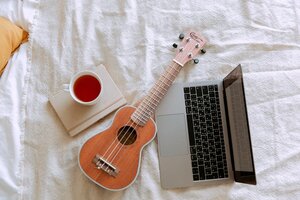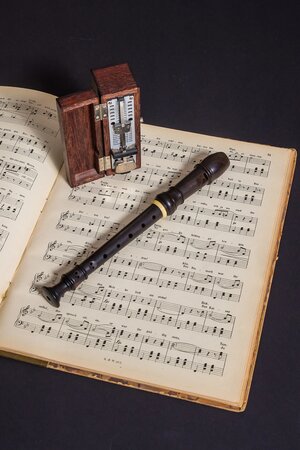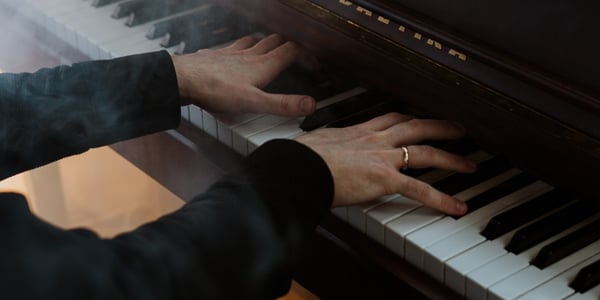So, you’ve decided to learn a new instrument - congratulations! As we’ve discussed in past blogs, ...
Top Musical Instruments for Beginners to Learn in Retirement
In past blogs, we have covered the reasons to learn a musical instrument and the top resources to help you learn an instrument from home. However, perhaps you are convinced it is time to learn an instrument, but you’re not sure where to start.
Of course, if you haven’t already, you must decide which instrument you want to learn to play. You’re going to be committing a lot of time learning how to handle, care for, play, and listen to the sound of the instrument, so getting this decision right will make a massive difference in your ability to commit to it. It is up to you, and as with any other decision, there are pros and cons to any choice. If you don’t have a lot of experience learning instruments, we recommend starting with one of these relatively simple instruments. This way, you can switch to something else if you don’t enjoy it or move on to a more advanced version if you can’t get enough.
The Best Instruments to Learn in Retirement
- Ukulele
 If you like stringed instruments or have always wanted to play guitar, the ukulele could be a great place to start. Like the guitar, you will have to learn chord and strumming patterns. However, the instrument is smaller, has only four strings, and can be much easier to learn without experience. Spending too much time just trying to understand the first chords can be discouraging, so being able to play your first song with the ukulele faster than you might have with the guitar might be enough motivation to keep you playing longer!
If you like stringed instruments or have always wanted to play guitar, the ukulele could be a great place to start. Like the guitar, you will have to learn chord and strumming patterns. However, the instrument is smaller, has only four strings, and can be much easier to learn without experience. Spending too much time just trying to understand the first chords can be discouraging, so being able to play your first song with the ukulele faster than you might have with the guitar might be enough motivation to keep you playing longer!
Another advantage to beginners is that ukuleles are generally much less expensive than guitars. Their size also makes them much more portable, making it easy to carry them around and practice wherever you like!
Once you get the hang of the ukulele and how to play it, perhaps you’ll decide to move up to a guitar, and you can enjoy the process of learning another new instrument all over again! - Harmonica
 Harmonicas are also considered to be one of the easiest instruments to learn. It is possible to teach yourself to play, and they are one of the easiest to add creativity to your playing, making songs your own faster than you can with other instruments.
Harmonicas are also considered to be one of the easiest instruments to learn. It is possible to teach yourself to play, and they are one of the easiest to add creativity to your playing, making songs your own faster than you can with other instruments.
Your perceptions of harmonicas might first conjure up images of cattle-driving cowboys, and there’s a reason they might have carried a harmonica along. They are one of the most portable instruments available! They can fit inside a pocket and are less fragile than many other instruments.
Again, harmonicas are also very affordable instruments. Top brands run under $50, and you can pick up other models for quite a bit less. - Piano
 One of the most popular choices is the piano. The piano is an enjoyable instrument to play either by yourself or with accompaniment. You can play practically any song on the piano, and you can get up and running with some of the simplest songs quite quickly!
One of the most popular choices is the piano. The piano is an enjoyable instrument to play either by yourself or with accompaniment. You can play practically any song on the piano, and you can get up and running with some of the simplest songs quite quickly!
Compared to the first two instruments, the piano is less mobile and requires a more considerable investment. However, there are many keyboards available today that can save you money and space, and come with several other advantages that might better fit your lifestyle, like volume control.
Another advantage of the piano is that it requires very little physical effort and, therefore, is easy to play at any age. While string instruments can be difficult on the player’s fingers, and instruments like the harmonica require a strong lung capacity, the piano is less demanding. It is about as easy as the press of a button, and you can begin creating beautiful sounds for everyone to enjoy. - Recorder
 Like several other instruments on this list, the recorder is both small, portable, and affordable. If you are interested in something like the trumpet or a flute, a recorder is a great place to start. It is significantly cheaper, and you can get a sense of how much you enjoy the practice before investing in a more expensive instrument.
Like several other instruments on this list, the recorder is both small, portable, and affordable. If you are interested in something like the trumpet or a flute, a recorder is a great place to start. It is significantly cheaper, and you can get a sense of how much you enjoy the practice before investing in a more expensive instrument.
They are also easy to care for, easy to clean, and do not require very much maintenance compared to others in their category.
Of course, there are plenty of other options out there, and it ultimately depends on your interest. Make sure you choose an instrument you can commit to. The first stages can be challenging, and many people lose their desire to continue learning when they cannot quickly play beautiful songs. Perseverance is key. We encourage you to pick up one of these instruments and experience the benefits of learning yourself!
Related Content:






